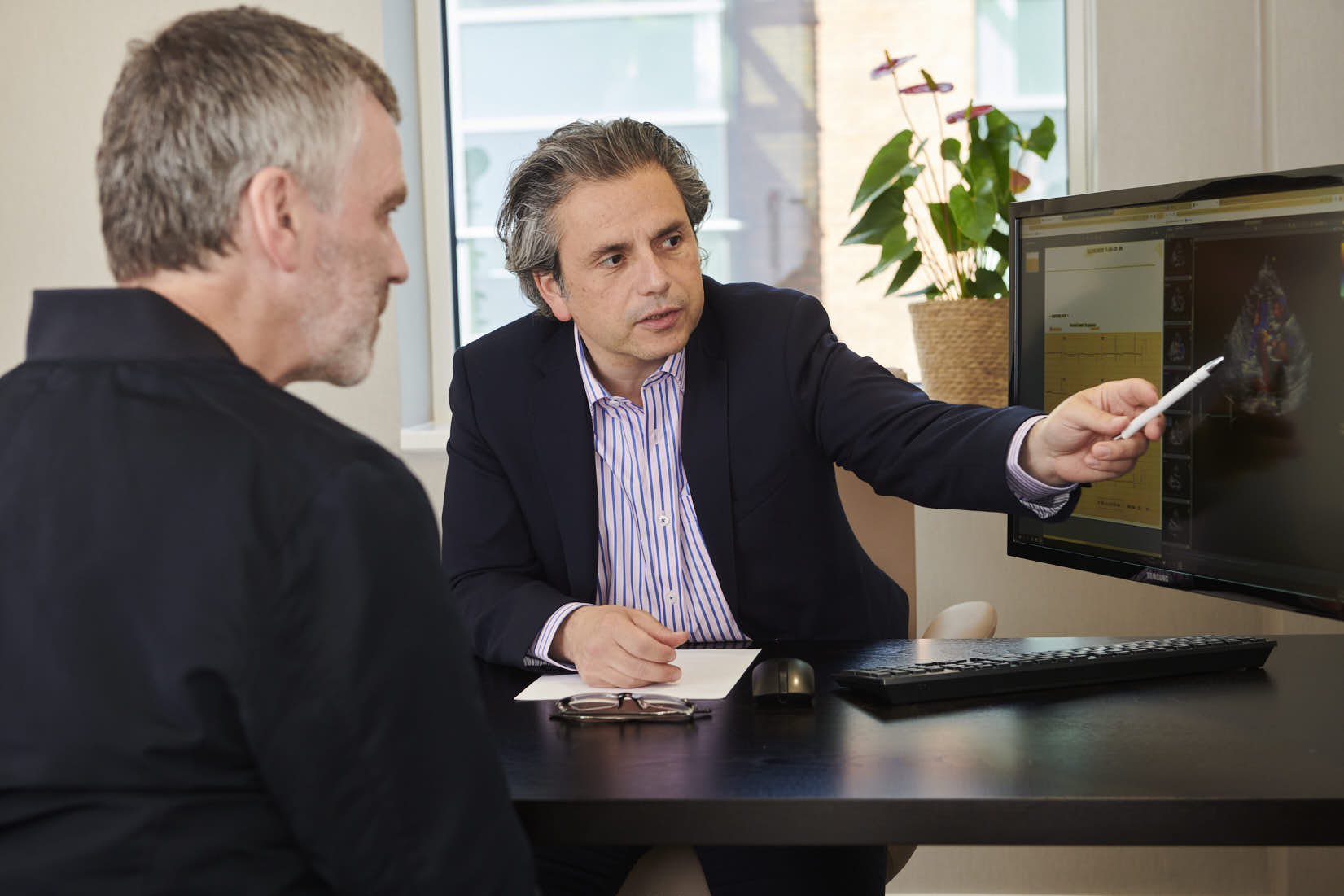Miss Rachel Clough
Consultant Vascular Surgeon
Specialist expertise: Vascular Surgery, Varicose Veins, Heart Health, Vascular.
Varicose veins are swollen, enlarged veins. They happen when valves in the veins are damaged and don’t work properly. They can cause symptoms and sometimes serious sores called ulcers.

Varicose veins are swollen, enlarged veins. They happen when valves in the veins are damaged and don’t work properly. They can cause symptoms and sometimes serious sores called ulcers. They are usually in the legs. Sometimes they are on the surface where you can see them, sometimes they are in veins you cannot see. Sometimes, varicose veins are surrounded by thin red or purple lines called thread veins. Whatever your experience with varicose veins, here at OneWelbeck, our consultant vascular surgeons are on hand to offer you first-class treatment and care.
Symptoms of varicose veins include:
Symptoms can be in one or both legs and you can have more than one symptom.
We don’t fully understand how varicose veins happen but we know they are more common if:
It is quite common to develop varicose veins in pregnancy. You can use compression stockings to help with your symptoms until you have recovered from the birth. Then you can consider the treatments we offer if they remain a problem after you have the baby.
The development of varicose veins can be broken down into six stages. Generally speaking, the earlier you seek treatment for varicose veins, the better the outcome.
The stages of varicose vein progression are:
Stage 0: No visible signs of veins but your legs may feel achy or tired.
Stage 1: There are some visible blood vessels and thread veins. You may experience some mild discomfort, especially after standing for a long time.
Stage 2: Enlarged varicose veins are visible and you may feel aching, throbbing and heaviness in your legs, particularly when standing.
Stage 3: The legs become swollen (oedema).
Stage 4: Skin changes occur, such as varicose eczema, the development of multiple small veins around the ankle and thickening and scarring of the skin on the lower leg.
Stage 5: Healed ulcers may occur, indicating a chronic venous disorder.
Stage 6: Active ulcer wounds may occur, indicating the most significant chronic venous disorder.
Improving your blood flow and muscle tone may lower your risk of developing varicose veins. Things to try at home to prevent varicose veins include:
Symptoms can come and go but the varicose veins will not go away by themselves. Varicose veins require treatment if you’re experiencing any pain, heaviness, swelling, itching, skin changes, red or warm skin, bleeding or ulcers. You may also wish to have them treated if you are worried about the appearance of the veins. If you do not seek treatment for varicose veins they can cause damage your skin, and in severe cases, you can develop venous ulcers (sores) on your skin. We recommend making an appointment to see a OneWelbeck specialist for a consultation and treatment as soon as you notice varicose veins.
Your specialist will offer you the most appropriate treatment for your veins. Closing or removing superficial varicose veins will not affect your circulation because your other veins will take over most of your blood goes through the deep veins. Your OneWelbeck specialist will guide you through your treatment options at your initial consultation, which may include:
Sclerotherapy: a chemical solution is injected directly into the varicose veins causing irritation to the vein walls, which stick together, and seal shut.
OneWelbeck Heart Health - Ultrasound Guided Sclerotherapy
Laser therapy: a laser catheter (a long, thin tube) is inserted into the vein to deliver heat energy that causes the vein to close off.
OneWelbeck Heart Health - Endovenous Laser Therapy (EVLT)
Phlebectomy: a tiny incision is made into the skin next to the varicose vein through which the vein is removed in small sections. The procedures take approximately 30-60 minutes and you will be able to walk and can go home shortly after the procedure is completed. You should aim to get back to your normal activities in 1-2 days and gentle exercise following the procedure is encouraged.
At-home self-care can also help to ease the pain of varicose veins while you are waiting to see a OneWelbeck specialist. If you have varicose veins it may help to exercise regularly, avoid prolonged standing, raise your legs when sitting or lying down, wear compression stockings and keep the skin well moisturised. Try not to injure your legs to help prevent bleeding.
How much does varicose veins treatment cost?
The costs depends on the treatment needed and can be discussed with you during your consultation with our OneWelbeck consultant vascular surgeons.
Are varicose veins curable permanently?
Although the treatments listed above are very effective, varicose veins can return. Risk factors that increase this probability include becoming pregnant after treatment, having a BMI over 30 and having a sedentary lifestyle.
How safe is treatment for varicose veins?
All of the methods used by our experienced specialists to treat varicose veins are safe and effective. As with any treatment, there are risks involved with each of them. These are minimal and will be outlined and explained to you by your consultant at your appointment.
Treatment for varicose veins in the testicles
Varicoceles are swollen veins in your scrotum. If they cause health problems, a non-surgical, permanent treatment called varicocele embolisation can be performed by one of our men’s health specialists to block and treat the affected veins.